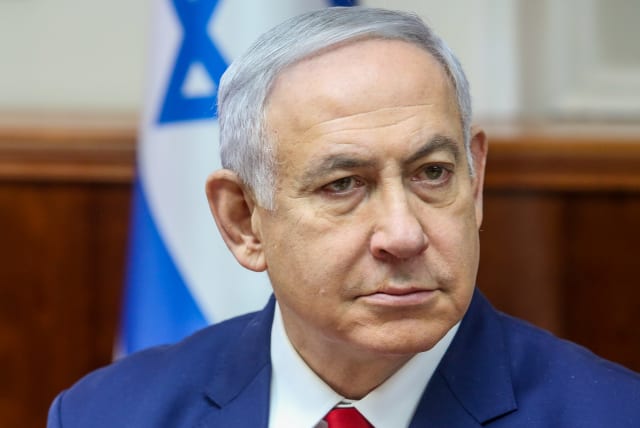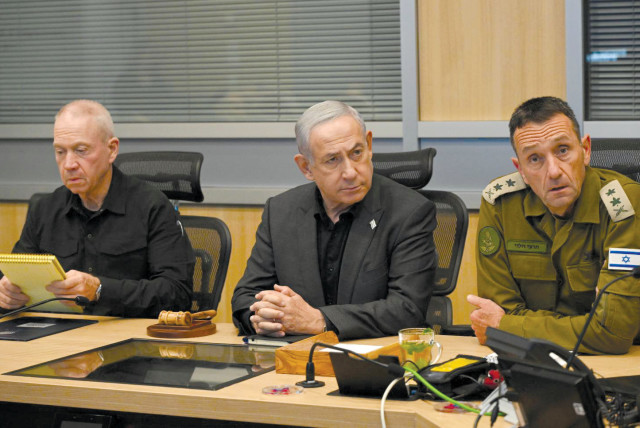The prime minister's diaries: This is what Netanyahu did on October 7

Despite many meetings and phone calls being censored, Netanyahu's diary entries provide an insight into the PM's psyche on and after October 7.
Prime Minister Benjamin Netanyahu's daily diary records for 2023 were released on Thursday, revealing what the prime minister did and who he talked to as the events of Hamas's October 7 massacre in southern Israel unfolded.
According to Netanyahu's diary, he received the first phone call of that fateful Saturday morning, warning him of Hamas's surprise assault, at 6:29 a.m., as rockets began hurtling toward Israel from the southern Gaza border communities to Tel Aviv and Jerusalem.
Morning of October 7: Woken up by Hamas, left home at 8:00 a.m.
The phone call, carried out by Netanyahu's military secretary, was when the prime minister claimed he was first informed of the invasion from Gaza.
Only 90 minutes later, as per the records, did Netanyahu leave his Ceasarea home en route to the Kirya military headquarters in Tel Aviv for further security assessments.
The diary states that US President Joe Biden was not the first world leader to call Netanyahu on the morning of October 7. Instead, Dutch Prime Minister Mark Rutte was the first to call Netanyahu, asking for an update on the situation in Israel's South.
Later on that day, Netanyahu spoke with Biden, as well as with French President Emmanuel Macron.
At around 11 a.m., four and half hours after Hamas's attack began, Netanyahu filmed a statement to the press outside the Defense Ministry offices, before holding a meeting at the Kirya at 12:30 p.m. with Finance Minister Bezalel Smotrich, Foreign Minister Eli Cohen, National Security Minister Itamar Ben-Gvir, Strategic Affairs Minister Ron Dermer, and Construction and Housing Minister Yitzhak Goldknopf.
In the afternoon, almost 10 hours after Hamas launched its invasion, Netanyahu met with opposition head MK Yair Lapid in Tel Aviv to brief him on the security situation, before convening the government at 6:00 p.m. At 8:30 p.m., the prime minister addressed the Israeli public in a statement.
According to the records, Netanyahu finished his work day at 3:15 a.m.
How Netanyahu reacted to October 7 attacks
Despite many meetings and phone calls since October 7 being censored due to what the Prime Minister's Office said were "information security purposes," some of Netanyahu's diary entries provide an insight into the prime minister's psyche in the days following the October 7 massacre.
The records revealed that on October 8, Netanyahu held numerous phone calls with a host of world leaders, including German Chancellor Olaf Scholz, Italian Prime Minister Giorgia Meloni, Canadian Prime Minister Justin Trudeau, and Ukrainian President Volodymyr Zelensky. He also spoke again with Biden and Macron.
Later that day, the prime minister held a private meeting with Defense Minister Yoav Gallant, Dermer, Smotrich and Agriculture Minister Avi Dichter.
Additionally, in the following days after the war broke, Netanyahu met with Israeli security experts, including retired Maj.-Gen. Ya'akov Amidror. Netanyahu also met with MK Gideon Sa'ar several times before he and National Unity head Benny Gantz joined the emergency wartime government early on in the war.
Jerusalem Post Store
`; document.getElementById("linkPremium").innerHTML = cont; var divWithLink = document.getElementById("premium-link"); if (divWithLink !== null && divWithLink !== 'undefined') { divWithLink.style.border = "solid 1px #cb0f3e"; divWithLink.style.textAlign = "center"; divWithLink.style.marginBottom = "15px"; divWithLink.style.marginTop = "15px"; divWithLink.style.width = "100%"; divWithLink.style.backgroundColor = "#122952"; divWithLink.style.color = "#ffffff"; divWithLink.style.lineHeight = "1.5"; } } (function (v, i) { });

